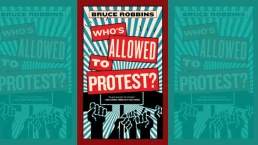By Sonali Kolhatkar, Independent Media Institute
The Supreme Court’s recent decision to overturn Roe v. Wade was predictable even as it was shocking. Right-wing forces have spent years working painstakingly on multiple fronts in plain sight to ensure that the right to an abortion would no longer be guaranteed, and they have won. Two of the three Supreme Court Justices, Brett Kavanaugh and Neil Gorsuch, who were appointed by former President Donald Trump, stand accused of lying about their positions on abortion. A third, Justice Clarence Thomas, invited challenges to same-sex marriage and the right to contraception as part of his undoing of Roe, hinting at the right wing’s future targets.

Contrary to the idea that men have foisted the abortion ban on women, in fact, the ban is a patriarchal attack by conservatives—men and women—against the rest of us.
So many forces had to align in order to ensure that women (and anybody with a uterus) will be forced into taking a pregnancy to term, that one wonders how—in light of other catastrophic emergencies like climate change and gun violence—could abortions be considered dangerous enough to ban? Are we not toying with death enough in the United States that we have to add to the ongoing tally of preventable deaths, the casualties that will result from botched abortions?
The answer may lie with a general attitude that forms the basis of most right-wing attacks: that the denial of rights will only affect someone else. Conservatives have perfected the art of outsourcing empathy. When others suffer, they must surely deserve it. And, when conservatives are personally impacted, they are the exception to the rule.
Stories abound of conservative women who picket abortion clinics, quietly coming in through the back door to get their own abortions taken care of. One abortion provider told the Daily Beast, “All of us who do abortions see patients quite regularly who tell us, ‘I’m not pro-choice, but I just can’t continue this pregnancy.’” She added, “These are not people who turn anti-choice after having an abortion, but who simply access this essential service when they need it in spite of their personal beliefs about abortion in general.”
The results of a survey of women who had abortions, which was commissioned by an anti-abortion Christian fundamentalist group called Care Net are instructive. Seventy percent of the 1,038 women surveyed claimed a belief in Christianity and 43 percent attended church monthly. Furthermore, nearly two-thirds of them worried that fellow churchgoers would negatively judge a single woman for being pregnant and only 7 percent openly discussed their decision to get an abortion.
In other words, those claiming to be against abortion for everyone else, seek it out quietly when they need one. It’s a classic case of, “do as I say, not as I do.”
This sort of logic of selfishness informs most conservative attacks on the needs of human beings and is based on an enduring belief that they are the exception to every rule.
Take gun violence. Those supporting the complete and easy availability of weapons of mass violence have no problem abiding by safety laws that protect the powerful. Armed members of the public are allowed nowhere near Supreme Court justices, members of Congress, or current and former presidents. Guns are also prohibited at National Rifle Association conventions when current or former presidents speak. The rationale is that when certain people’s safety is at stake, it’s okay to prohibit guns. The rest of us—even children and the elderly—have to risk living among armed and dangerous people.
Take government welfare programs. Conservatives love to rail against aid to vulnerable populations. Republican lawmakers have made it their mission to slash what they have dubbed as “entitlement” programs for years. But it’s their voters who often rely most heavily on food stamps and other benefits. In fact, white Americans, who are overrepresented among conservatives, tend to support welfare programs, until they discover those programs might also help people of color.
Take voting rights. Conservatives and Republicans want to make it harder for people to vote in a nation that already struggles with voter turnout. This effort, intended to ensure minority rule, is premised on a false claim that millions of people vote for Democrats illegally. But in fact, most of the very small handful of people caught illegally voting have turned out to be Republicans.
Circling back to abortion, it’s a fair bet that if anti-abortionists had a way to ensure their own personal access to abortion when they needed it, and a ban for everyone else, they might choose such a logical leap.
There was a time when abortion was seen as the first resort of birth control for sex-crazed teenagers. Such visions fueled a fundamentalist Christian worldview of rampant promiscuity among the youthful heathen masses. But today’s typical patient needing an abortion is a low-income woman in her late 20s who has already had one child and cannot afford another one.
In fact, abortions are so common that nearly a quarter of all people capable of pregnancy will have one in their lifetimes by age 45. That percentage may be even higher considering that researchers find people severely underreport their abortions.
Part of the problem is that until recently there has been little narrative work done by organizations supporting the right to an abortion to destigmatize the procedure. Now more and more people are coming forward to tell their stories, most of which are mundane tales about forgetting to take contraception, or finding that their birth control method failed.
Hollywood has been particularly egregious in helping to cloak abortion access in a pall of shame. Recall the wildly successful 2007 film “Juno” starring Elliot Page as a pregnant teen who decides against getting an abortion and carries an unwanted pregnancy to term. The film was typical of how Hollywood treated characters struggling with unwanted pregnancies. Screenwriter Diablo Cody concedes that she wouldn’t write such a plot in today’s political environment, saying, “In a way I feel like I had a responsibility to maybe be more explicitly pro-choice, and I wasn’t.”
Cody is not alone. So-called liberals in Hollywood have written so many anti-abortion tropes into their plot lines that some years ago activist Fatima Goss Graves pleaded with women writers at a conference to begin normalizing abortions on screen. Her exhortation appears to have worked and works of fiction are finally treating abortion as the mundane and shame-free health procedure that it is. But it’s too little, too late and years of invisibility and shame paved the road to Roe being overturned.
There will come a time when anti-abortion conservatives finding themselves in need of abortion services will have nowhere to turn to, becoming the victims of their own wild success. The realization that abortions are part of necessary health care that even they need, will also be too little, too late.
This article was produced by Economy for All, a project of the Independent Media Institute.
Sonali Kolhatkar is the founder, host and executive producer of “Rising Up With Sonali,” a television and radio show that airs on Free Speech TV and Pacifica stations. She is a writing fellow for the Economy for All project at the Independent Media Institute.
Recent Posts
Trump’s Concentration Camp Build-Out Includes Nearly $40 Billion for Warehouse Conversions
February 14, 2026
Take Action Now “Germany’s concentration camps didn’t start as instruments of mass murder, and neither have ours,” wrote talk show host Thom…
Everyone Is Allowed To Protest
February 13, 2026
Take Action Now Tied up with the apparently very longstanding tradition of claiming that all opponents of atrocities are purely engaged in what has…
Abolition Is Still The Only Way Out Of This
February 13, 2026
Take Action Now Forget the useless so-called “reforms” to ICE and policing currently on offer. We need much more fundamental change.By Andrea J.…
Leading Papers Call For Destroying Iran To Save It
February 11, 2026
Take Action Now The opinion pages of the New York Times and Washington Post are offering facile humanitarian arguments for the US to escalate its…




